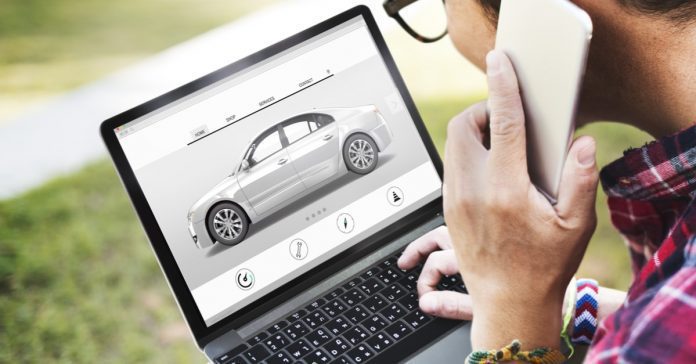Despite the continual march toward seemingly everything being online, the world of automobile sales is a bit of a hybrid. About 59% of car buyers research a car online before walking into a dealership, and many more consumers use individual dealer websites and aggregate search engines like Autotrader. However, since the start of the COVID-19 pandemic, the landscape of buying and selling vehicles has completely changed.
Today, inventory shortages of new and used vehicles make the common practice of researching and locating cars on dealer lots almost obsolete. To combat this, dealerships must be willing to look outside their own ZIP codes and consider selling cars online.
So, how and why should dealers be selling their vehicles online? Let’s dig in.
Taking advantage of established online marketplaces
Most dealerships understand the power of advertising their inventory online. Consumers look for the car they want, find a potential dealership that may have the vehicle in stock via many search engines, and then contact the dealer by phone or digitally to set up an appointment. Most BDC representatives are motivated and paid to get people in the door.
This marketing and sales tactic in today’s marketplace may not be enough to get people in the door and sell vehicles. Getting people in your local area in the door is difficult when you don’t have many cars to sell. It doesn’t matter if it’s a used or new vehicle; the problem remains the same.
Established vehicle search sites like Bumper, Autotrader, Car Gurus, eBay, and more have adapted to modern times by offering extended delivery options to customers looking for a particular make and model. This means a customer purchasing a vehicle from out of state or another part of the state can buy a car from your dealership and have it shipped to them at their cost.
This is a game-changer for modern dealerships because it instantly expands the reach beyond local ZIP codes. While crossing state lines may not be an option for new cars, it’s certainly an option for used vehicles. If your used car manager is great at picking off unique or desirable cars, you may be missing out on a golden opportunity to sell these one-off vehicles to people all over the country.
No matter which platform you use, offering an extended shipping option will allow more people from more places to buy vehicles from your dealership. These days, there are plenty of options that enable dealerships to check credit, complete credit applications, and complete paperwork remotely. Expedited shipping is also available.
 Benefits of selling cars online
Benefits of selling cars online
First and foremost, the most obvious advantage to selling cars online is the option of producing extra revenue for your dealership.
Rather than rely on local residents for sales, selling cars online instantly expands your reach well beyond your market area. This means you can reach more well-qualified buyers with relative ease. People who would pay to have a vehicle shipped to them are very serious buyers, with fewer chances that these deals will fall through.
Used vehicles are especially lucrative in this scenario because you can’t exactly order a used car from the factory. Oftentimes, uniquely optioned cars, trucks, and SUVs are sought out by highly particular buyers who will pay more for the vehicle and have no problem paying to have it shipped to their door. Special option packages on trucks, unique trim levels, and manual transmission-equipped sports cars are all examples of vehicles that pull very well online.
Beyond the extra revenue stream, selling cars online can also bring notoriety to your dealership and provide long-term customers and referrals that you would not otherwise be able to capture in your local markets.
Tips for selling cars online
Because selling online may be a significant culture shift for your dealerships, here are some easy tips for getting started the right way.
Staff appropriately
Once you commit to selling cars online, you may need to adjust your staffing. Managing an online portfolio with locally available inventory can be challenging. The best way to overcome this challenge is to hire a dedicated online sales manager that manages listings, does descriptions, and answers questions from buyers all over the country.
This online sales manager role will also have a logistics and operations component to it as well. They’ll need to interface with shipping agents and understand what needs to be done to move a vehicle from one place to another. Some dealerships have these roles already installed, while others are shifting responsibility to internet sales managers for this task.
Up your photo and video game
Because many buyers will not be able to see the vehicle in person, there must be accurate and complete photos listed on every vehicle for sale. In addition, a video walk-around is a must when selling cars online. You need to convince the buyer digitally that your vehicle is the one they want to spend their hard-earned money on, and the only way you’ll be able to do it is with photos and videos. Hire a professional photographer for the best results.
Be honest with condition reports
Online buyers tend to be fussy about the vehicle condition they purchase, so all staffers who manage listings must be dedicated to listing the nitty-gritty details with extreme precision. Every single defect on the car must be documented, from scratches to scuffs and bumps. Otherwise, you put yourself at risk of unhappy customers. If there’s anything that will kill your online reputation fast, it’s not being honest about what’s in the listings.
The world is changing
Moving with the times is crucial to a dealership’s success, especially when the world seems to be changing right before our eyes on a daily basis. Suddenly, online-only car sales companies like Carvana, Vroom, and Shift are eating away at the revenue of established dealership models. CarMax has been shipping inventory within its network of dealers for years, and it has led to its great success.
Traditional dealerships can compete with juggernauts like CarMax and other online-only retailers by capturing valuable revenue gained by shipping vehicles to buyers out of their market area and partnering with companies who can feed your dealer inventory nationwide. This is not a trend that’s going to shrink. Selling cars online should only expand over the coming years and decades.
The world is changing. It’s time for your dealership to be ready for the challenge.
Did you enjoy this article? Please share your thoughts, comments, or questions regarding this topic by connecting with us at newsroom@cbtnews.com.
Be sure to follow us on Facebook, LinkedIn, and TikTok to stay up to date.
While you’re here, don’t forget to subscribe to our email newsletter for all the latest auto industry news from CBT News.



